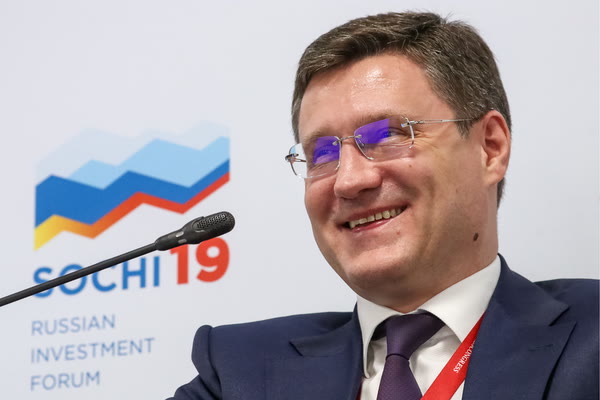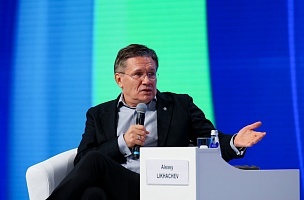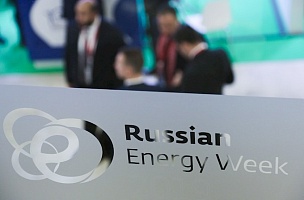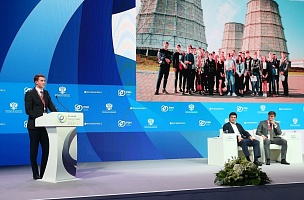KEY CONCLUSIONS
Fuel and energy sector remains the leading and most competitive one in the Russian economy
“The total investment in the fuel and energy sector in all areas amounted to about 5 trillion roubles in 2018. That is about 40% of the total investment volume. The fuel and energy sector drives the development of many industries; it accounts for 25% of the GDP and about 60% of exports,” Alexander Novak, Minister of Energy of the Russian Federation.
“The share of Russian gas in the global market has grown to 40%. At the time when the battles around Russian gas started, the share was smaller: it was 35%. The consumer chooses a competitive supplier. As for oil, we take up 11% of the overall global market,” Alexander Novak, Minister of Energy of the Russian Federation.
“We have invested USD 1.8 billion in ZapSibNeftekhim out of the Russian National Wealth Fund. That said, the yield was higher than if the funds were invested in American securities,” Kirill Dmitriev, Chief Executive Officer, Russian Direct Investment Fund (RDIF).
Development of the fuel and energy complex stimulates growth, retrofitting and upgrading in related industries
“The share of horizontal drilling in Russia went up from 27% to 40%. Thanks to that, pipeline manufacturers like us have performed technology overhaul. Over USD 12 billion in private investment has been drawn into the Russian pipe industry,” Dmitriy Pumpyanskiy, Chairman of the Board of Directors, Tube Metallurgical Company (TMK); Chairman of the Board of Directors, Sinara Group.
“Russian railways and the fuel and energy sector are inseparable. The fuel and energy sector accounts for 60% of the cargo turnover of the Russian railways. Our plans are set accordingly. We plan to invest nearly 9 trillion roubles before 2024. <...> We see an increase in coal exports as the key element. By 2025, it should increase to 500 million tons. That is why nearly 700 billion roubles have been allocated to modernize the Baikal–Amur Mainline and the Trans-Siberian Railway,” Oleg Belozerov, Chief Executive Officer – Chairman of the Executive Board, Russian Railways.
PROBLEMS
Reduction in productivity of existing fields requires an increased investment into the industry
“By 2035, 50% of the capacities that are currently producing, naturally will not be able to produce oil. We need to replace those capacities,” Alexander Dyukov, Chairman of the Management Board, Chief Executive Officer, Gazprom Neft.
“Over the past 8 years, the productivity of deposits that we work with has decreased 6 times. In order to preserve the current production level, we have to drill many more high-tech wells; their share exceeds 70%,” Alexander Dyukov, Chairman of the Management Board, Chief Executive Officer, Gazprom Neft.
SOLUTIONS
Transition to deeper processing of fuel and energy products
“Advanced processing, as well as diversification of the oil and gas sector: that is the future. All of that is expensive, that costs a lot. Oil and gas companies are the ones that are interested in and capable of investing that kind of money,” Dmitry Kobylkin, Minister of Natural Resources and Environment of the Russian Federation.
“The government has worked out the proposals for developing such a sector as petrochemistry. We see great potential here. We now occupy only 2% of the global market for petrochemical products,” Alexander Novak, Minister of Energy of the Russian Federation.
Supporting investment projects and improving regulation
“Tax expenditures of the region to support investment projects amount to 1% of the GRP. The second component is creating a favourable regulatory environment,” Natalya Komarova, Governor of Khanty-Mansi Autonomous Area – Yugra.
Investing in development and modernization
“We invest 250 billion roubles a year in developing a network complex. Not only we are going to digitize the largest network in the world – we will make something more out of it,” Pavel Livinsky, Director General, Rosseti.
“By 2024, we can reach the investment volume of 7.5 trillion roubles. That is, in fact, a 50% increase in volume. To do that, we need to stimulate oil production in Western Siberia at existing fields, invest in petroleum chemistry (400 to 500 billion roubles a year), produce and sell LNG in global markets (USD 70 to 100 billion in investment), modernize the power industry (2 trillion roubles),” Alexander Novak, Minister of Energy of the Russian Federation.
Attracting private investment into the industry
“We should not be scared to transform enterprises that are now 100% controlled by the government into joint-stock companies. Small shares (5% to 10%) should be released out to the market,” Valery Seleznev, First Deputy Chairman of the Committee on Energy, The State Duma of the Federal Assembly of the Russian Federation.






